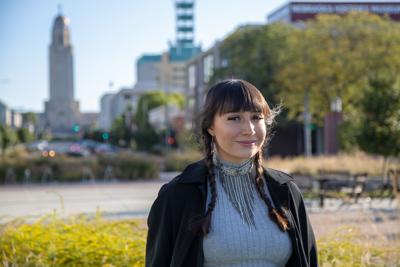On Monday, members of the University of Nebraska Inter-Tribal Exchange strolled around campus, handing out flyers and telling the University of Nebraska-Lincoln community why they were celebrating Indigenous Peoples’ Day instead of Columbus Day.
This is just one of the ways UNITE strives to educate students on Native American issues throughout the year. The group also hosts an annual spring powwow on the greenspace by the Nebraska Union and encourages native and non-native students alike to attend their weekly meetings at 5 p.m. on Tuesdays in the Alexander Building.
Each week, the group meets to play games, eat snacks and talk about their experiences as native people on UNL’s campus. UNITE focuses on being an outlet for Native American students to be themselves and on interacting with their Native American culture and heritage, according to senior journalism major and UNITE social outreach chair Seth Marshall.
Marshall said he found a second family in UNITE as he searched for a community at UNL after transferring from Southeast Community College in the spring of 2017.
“My first week at UNL, I was close to dropping out because it was just so intimidating, but as soon as I got with UNITE and with the Jackie Gaughan Multicultural Center, I found my place,” he said. “I found, essentially, a family to be with, and that has had a huge impact on me as a person.”
With only 50 to 60 native students out of more than 25,000 at UNL, Marshall said it can be hard to find others on campus that share his experiences or relate to his everyday struggles as a Native American.
“[These organizations] make you feel like you belong on campus,” he said. “It's a very needed experience. I know a lot of people who are from small reservations, and when they came to UNL, they were immediately intimidated by it. There are not a lot of brown faces on campus, and that is a tough situation.”
Along with giving native students a place to call home, Marshall said UNITE members want to share their culture with the rest of the UNL community so it can be better understood.
Luta Menard, the vice president of UNITE and a sophomore ethnic studies major, is also the president of the Education and Awareness Committee within UNITE. The committee’s goal is to make non-native UNL students more aware of the Native American culture, according to Menard. Both the Education and Awareness Committee and the Campus Outreach Committee work to make UNL students more informed.
Menard said she believes some of the ignorance on UNL’s campus comes from a lack of information and awareness rather than from blatant rudeness.
“It is a really small percentage of the university, and then even a smaller percentage of the graduates at UNL, who are Native American,” she said. “So I think it's really hard to find information unless you're seeking it out or we come to you with it.”
Menard said she hopes UNL students make an effort to understand the Native American culture that surrounds them. Lincoln is built on land that formerly belonged to several Great Plains tribes, so the history of those tribes is very relevant to native and non-native people that live in Lincoln, according to Menard.
UNITE is not just for Native American students but also for any student wanting to learn and better understand Native American culture, Menard said.
Even though UNL’s Native American population is small, it is diverse, according to Menard and Marshall. Every native student’s experience is unique, they said, so asking individuals questions and hearing their experiences can be more beneficial than making broad generalizations about native people.
“We are such a small population that everyone thinks we're the expert about everything [regarding Native Americans],” Menard said. “Just acknowledging that everyone has a very diverse background, and that [background] might not be the same as another Native American, is very important.”

